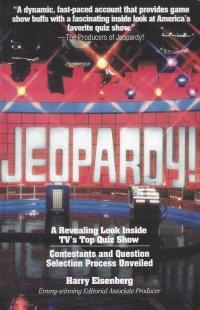 This book came out a couple of years after The Jeopardy! Book and refers to it as a lightweight cash-grab that only glosses on the show and presents quizzes without actually delving into the backstage workings of the show. Which, come to think of it, is kind of what I said in my review of that book in 2009 (for historical perspective, five years before I auditioned for the program, and seven months before I moved to Nogglestead from Old Trees–so a long time ago).
This book came out a couple of years after The Jeopardy! Book and refers to it as a lightweight cash-grab that only glosses on the show and presents quizzes without actually delving into the backstage workings of the show. Which, come to think of it, is kind of what I said in my review of that book in 2009 (for historical perspective, five years before I auditioned for the program, and seven months before I moved to Nogglestead from Old Trees–so a long time ago).
This book, on the other hand, is written not by ghost writers, but by one of the actual writers (who had just left the show). It includes insights into how one goes about making up the questions for each program as well as how the shows are filmed and some of the personalities involved–Alex Trebek was the producer on the first season, but he was replaced with someone that Merv Griffin had worked with previously. The book also gives short biographies of all the parties involved, from Trebek and Griffin to the various writers, producers, researchers, and receptionists.
The book also tells the history of Kings World who distributed the show and Merv Griffin Productions and how all of that works out, and how Jeopardy! was a surprise holding the #2 game show slot behind Merv Griffin/King World’s Wheel of Fortune.
Which kind of led me to the question: Has the New York Post been ragging on these game shows over the past, what, year to get a better distribution agreement or price? I mean, readers have been subjected to seemingly daily stories mining Twitter for hot takes on anything that anyone said negative about the shows.
For example:
- ‘Jeopardy!’ fans cheer Ken Jennings replacing Mayim Bialik: ‘Don’t let her back’
- ‘Jeopardy!’ fans complain show is ‘unwatchable’ after recent flubs
- ‘Jeopardy!’ contestant slams show for not paying for travel, hotel room
- ‘Jeopardy!’ champion James Holzhauer reveals show’s problem that’s been causing fans to rage
- Final ‘Jeopardy!’ clue blasted as not ‘appropriate’: ‘Hate this’
- ‘Jeopardy!’ fans outraged by ‘horrendous’ movie category: ‘Awful’
- ‘Jeopardy!’ producer asks fans to forget ‘horrible’ episode: ‘Something we never like to see’
- Ken Jennings reveals the ‘cringey’ part of ‘Jeopardy!’ he ‘never liked’
- ‘Jeopardy!’ fans call out Mayim Bialik for inconsistent hosting rules
Those are headlines from the last month. And prior to Pat Sajak announcing his retirement, the paper also ran numerous articles about bad puzzles, Sajak’s inappropriate behavior, and so on, to rag on Wheel of Fortune. Like I said, I wonder what’s up with that and suspect it’s a money thing between the Murdochs and Sony, who now owns the shows.
At any rate, definitely a better read than the other book, and probably more insightful into the show than a contestant’s book would be. The Afterword wanders away from the core topic matter and into a bit of a polemic about the role of television, even Jeopardy! on public discourse. It doesn’t really add to the book, but I guess the author thought it was important.
Also, note the timestamp on the book (1995), and note this bit of prescience:
The new game’s experience of its young existence was to be presented to George [the producer] for his comments and approval. If a particular clue bothered him he ordered it replaced. For some reason he hated references to hamsters or gerbils; he seemed to consider these creatures obscene and so that was out. Other no-nos included references to Donald Trump, the quiz show scandals of the 50s, and mentions of Zsa Zsa Gabor.
Jeopardy! declared Donald Trump persona non grata before it was cool. Or maybe it was always cool to a certain set.


